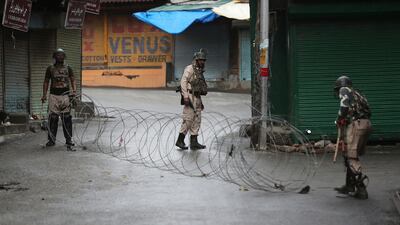To the rest of India, Srinagar feels like a remote planet: a place isolated in deep space, from where communication signals return after a long, unnerving delay.
For a week now, the state of Jammu and Kashmir – including Srinagar, its capital of a million people – has been under lockdown.
Before the Indian government stripped the state of its constitutional autonomy and split it into two federally administered halves on Monday, it suspended telephone and internet services.
A 24-hour curfew was imposed. Leading politicians were placed under house arrest. Over the past week, others have been detained as well: academics, activists, legislators, anyone who might spark protest over the government’s move.
Protests happened anyway. On Friday evening, after prayers, 8,000 to 10,000 people marched in Soura, a Srinagar neighbourhood.
Police used shotguns and tear gas to disperse the demonstrations. While the BBC broadcast footage of clashes between police and protesters, India’s Home Ministry insisted that reports of the incident were “completely fabricated and incorrect.”
Prasar Bharati, the state-run news service, tweeted a short clip of heavy traffic on the roads and wrote: “Contrary to some fake news reports, it’s business as usual in Srinagar.”
But the trickle of media footage, articles and first-person accounts suggests that Srinagar is closer to a state of siege, and that resentment is running high among Kashmiris, particularly as they prepare to celebrate Eid Al Adha on Monday.
Only on Saturday was curfew relaxed somewhat, allowing Kashmiris to prepare for the festival.
Until then, citizens had been darting out before dawn to buy groceries, milk and medicine, trying to return home before 6am.
Any later and they were liable to be stopped by armed troops at any one of the many barricades, or to be blocked by large coils of razor wire strung across streets.
“Then the day goes in watching television, some sleep and waiting for the evening when soldiers withdraw from the streets,” Reyaz Ahmed, a trader, told AP on Friday.
Two days earlier, Mr Ahmed had to double through side lanes to avoid barricades so he could walk 7 kilometres to visit an infirmed aunt.
While Kashmir has had mobile and internet services suspended in the past, landlines have always worked. This time, even that link has been cut.
"It's impossible to remember a time like this, where we're so cut off not only from the rest of the country but from each other," a lawyer who travelled from Srinagar to New Delhi this past week, told The National.
Relatives of Kashmiris, unable to reach their families, travelled to reach them.
Syed Nazakat, the founder of DataLeads, a New Delhi start-up, tweeted a photo from the city’s airport on Sunday morning.
“Boarding a flight to Srinagar,” Mr Nazakat wrote. “The only way I could find to reach my parents.
"I haven’t been able to contact them since the lockdown started on Monday. This is the story of every family from Kashmir living away from the valley.”
A journalist, Siddharth Varadarajan, flew to Kashmir then back to Delhi to file a video filmed in SMHS Hospital in Srinagar.
A weeping mother, whose son was injured by metal pellets last week, said security forces had fired at him from a car window as he was walking along the street.
“He had gone to study. He even had his bag with him,” she said.
The shot fired by troops is not always lethal but often damages eyesight. At least 21 boys and young men were admitted to SMHS with eye injuries, Mr Varadarajan said.
“There is too much cruelty going on,” a young man said in the video, holding a wad of cotton to his eye.
“If this carries on, nothing will remain in this world. We will all die. We will give our lives.”
On Saturday, Shahid Choudhary, the district magistrate of Srinagar, tweeted that some curbs on movement were being lifted in many parts of the city.
“More than 250 ATMs have been made functional," Mr Choudhary said. "Bank branches are also open. Advance salary on Eid eve are being credited today.”
Queues formed outside ATMs as people rushed to withdraw cash, to then buy Eid supplies from the few markets that opened.
But the government gave no indication of whether all curfew rules would be completely lifted for Eid, whether it would allow gatherings for prayers or other purposes, or whether phone and internet services would be restored for the holiday.
And troops remained heavy on Srinagar’s streets, ensuring that Eid would be celebrated in a tense, sullen atmosphere.

